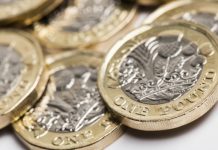The pound reached a three and a half month high versus the euro on Wednesday, hitting €1.1450 for the pound, before pulling selling off sharply. Investors are completely focused on the Bank of England meeting today.
| What do these figures mean? |
|---|
|
When measuring the value of a pair of currencies, one set equals 1 unit and the other shows the current equivalent. As the market moves, the amount will vary from minute to minute. For example, it could be written: 1 GBP = 1.13990 EUR Here, £1 is equivalent to approximately €1.14. This specifically measures the pound’s worth against the euro. If the euro amount increases in this pairing, it’s positive for the pound. Or, if you were looking at it the other way around: 1 EUR = 0.87271 GBP In this example, €1 is equivalent to approximately £0.87. This measures the euro’s worth versus the British pound. If the sterling number gets larger, it’s good news for the euro. |
Investors were encouraged in the previous session by data which showed that the UK manufacturing sector expanded more in October than what analysts had been anticipating. The sector continues to brush off Brexit-related uncertainties and reap the benefit from a weaker pound. This was the final hurdle for the pound prior to the Bank of England’s (BoE) decision on interest rates later today, and investors are viewing the robust growth in manufacturing as an encouraging sign that the central bank will raise rates.
The pound will remain vulnerable as we head towards the decision. Investors are almost completely convinced (91%) that a rate hike will happen, which means that the risk is to the downside. Should the BoE raise rates but a give conservative update, the pound could fall. This is because investors will assume that this hike is a one off and will not happen again next year.
Today’s meeting will also see the release of the quarterly inflation report. Investors will be paying particular attention to the inflation outlook. This is because continued high levels of inflation could merit another interest rate hike in the near future. Therefore, should the BoE forecast that inflation could remain at its current level of 3% for a considerable period going forward, the pound could rally.
| Why do raised interest rates boost a currency’s value? |
|---|
| Interest rates are key to understanding exchange rate movements. Those who have large sums of money to invest want the highest return on their investments. Higher interest rate environments tend to offer higher yields. So, if the interest rate or at least the interest rate expectation of a country is relatively higher compared to another, then it attracts more foreign capital investment. Large corporations and investors need local currency to invest. More local currency used then boosts the demand of that currency, pushing the value higher. |
Will German Employment Data Reverse the Euro’s Fortune?
The euro has been out of favour since the European Central Bank (ECB) meeting last week. ECB President Mario Draghi poured cold water on recent euro strength after his conservative tone following the ECB meeting. He successfully quashed any hopes of an interest rate hike until early 2019, in addition to halving and extending the ECB’s bond-buying programme. With the bond buying program, the ECB buys investments bond in the market in place of an investor. The investor then has money to spend on buying bonds other than the ones the ECB buys, thereby increasing the supply of money in the economy.
The previous session was light on economic data for the bloc, leaving investors to continue processing weak inflation data from earlier in the week. The drop in inflation meant that investors also weighed on the odds of an interest rate hike any time soon, pulling the euro lower.
Today sees the release of employment data for Germany, the economic powerhouse of Europe. Given the strong employment figures for the eurozone as a whole, analysts are expecting the German figures to be solid. A strong reading could help limit the euro’s losses.
| Why does strong economic data boost a country’s currency? |
|---|
| Solid economic indicators point to a strong economy. Strong economies have strong currencies because institutions look to invest in countries where growth prospects are high. These institutions require local currency to invest in the country, thus increasing demand and pushing up the money’s worth. So, when a country or region has good economic news, the value of the currency tends to rise. |
|
This article was initially published on TransferWise.com from the same author. The content at Currency Live is the sole opinion of the authors and in no way reflects the views of TransferWise Inc. |





